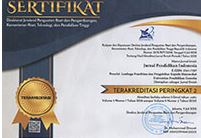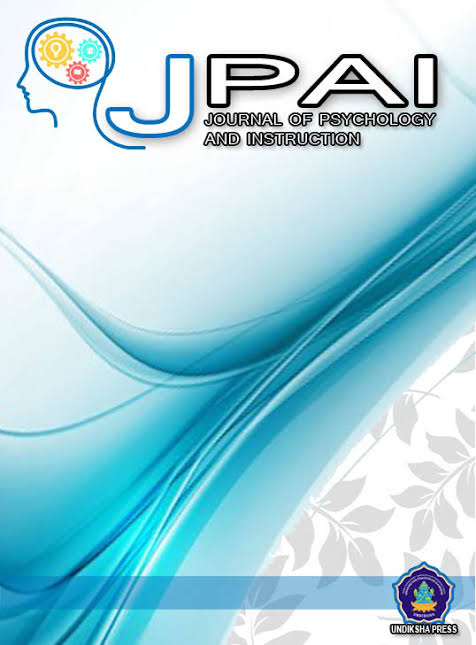Correlation between Perceptions of School Support and The Mastery Of Information Technology to Teachers' Self-Efficacy
DOI:
https://doi.org/10.23887/jpai.v4i1.24450Keywords:
Self-Efficacy, Perception, School Support, Mastery of Information Technology, TeacherAbstract
Curriculum 2013 requires teachers to master information technology in order to teach in a better way. In fact, many elementary school teachers have not been able to use computers. Lack of school support and information technology skills may be associated with low self-efficacy. The purpose of this study is to determine whether teachers’ self-efficacy can be predicted by school support and mastery of information technology. Subjects of this research were 225 teachers from 19 elementary schools in Daerah Istimewa Yogyakarta province, which have become the pilot project of Curriculum 2013. Instruments used in this study were Self Efficacy Scale, School Support Scale, and Information Technology Test. The data were analyzed using multiple linear regression analysis. The result of this study found that school support and mastery of information mastery simultaneously positively correlated to teachers’ self-efficacy with a correlation value of 139,616 significance level p<0,01. The effective contribution of school support and mastery of information mastery together positively correlated to teachers’ self-efficacy is 55,7%.
References
Alharbi, G. (2012). Primary school teachers’ perceptions regarding ict usage and equipment in kuwait. Journal of International Education Research, 8(1). DOI: https://doi.org/10.19030/jier.v8i1.6696
Aõalsteinsson, R.I., Frímannsdóttir, I.B., & Konráõsson, S. (2014). Teachers’ self-esteem and self-efficacy. Scandinavian Journal of Educational Research, 58(5), pp. 540-550. DOI: https://doi.org/10.1080/00313831.2013.773559
Arsanti, T.A. (2009). Hubungan antara penetapan tujuan, self-efficacy dengan kinerja. Jurnal Bisnis dan Ekonomi, 16(2), pp. 97 – 110.
Awkard, T., 2017. The power of reflective action to build teacher efficacy. Kappanmagazine.org, 98(6). DOI: https://doi.org/10.1177/0031721717696479
Bandura, A. (1997). Self-efficacy:The exercise of control. New York: W.H. Freeman and Company.
Bruinsma, M., & Jansen,E.P.W.A., (2010). Is the motivation to become a teacher related to pre-service teachers’ intentions to remain in the profession?. European Journal of Teacher Education, 33(2), pp. 185-200. DOI: https://doi.org/10.1080/02619760903512927
Chiou, W.B., & Wan, C.S. (2007). The dinamic change of self efficacy in information searching on the internet: influence of valence of experience of prior self-efficacy. The Journal of Psychology, 141(6), pp. 589-603. DOI: https://doi.org/10.3200/JRLP.141.6.589-604
Coladarci, T., & Breton, W.A. (1997). Teacher efficacy, supervision, and the special education resource-room teacher. The Journal of Educational Research, 90(4), pp. 230-239. DOI: https://doi.org/10.1080/00220671.1997.10544577
Departemen Pendidikan Nasional (Depdiknas). (2005). Kurikulum 2004. Jakarta: Departemen Pendidikan Nasional.
Demiralay, R., & Karadeniz, S. (2010). The effect of use of information and communication technologies on elementary student teachers’ perceived informastion literacy self-efficacy. Educational Sciences: Theory & Practice, 10(2).
Feist, J. & Feist, G.J. (2008). Theories of personality. Jakarta: Pustaka Pelajar
Fimian, M.J., (1986). Social support and occupational stress in special education. Exceptional Children, 52, pp. 436 – 442. DOI: https://doi.org/10.1177/001440298605200505
Goeman, K., Elen, J., Pynoo, B., & van Braak, J. (2015). Time for action! ICT integration in formal education: Key finding from a region-wide follow-up monitor. Technology Trends, 59(5). DOI: https://doi.org/10.1007/s11528-015-0890-6
Kruger, L.J. (1997). Social support and self efficacy in problem solving among teacher assistance teams and school staff. The Journal of Educational Research, 90(3), pp. 164-168. DOI: https://doi.org/10.1080/00220671.1997.10543772
Newman, F.M. Rutter, R.A., & Smith, M.S. (1989). Organisational factors that affect school sense of of efficacy, community, and and expextation. Sociology of Education, 62, pp. 221-238. DOI: https://doi.org/10.2307/2112828
Nasution, S. (2003). Asas-asas kurikulum. Jakarta: Bumi Aksara.
Prieto, L.R. & Altmaier, E.M. (1994). The relationship of prior training and previous teaching experience to self efficacy among graduate teaching assistants. Research in Higher Education, 35(4), pp. 481-497. DOI: https://doi.org/10.1007/BF02496384
Raudenbush, S.W., Rowan, B., Cheong, Y.F. (1992). Contextual effects on the self percieved efficacy of high school teachers. Sociology of Education, 65(2), pp. 150-167. DOI: https://doi.org/10.2307/2112680
Roberts, J.K., Henson, R.K., Tharp, B.Z., & Moreno, N. (2000). An examination of change in teacher self-efficacy beliefs in science education based on the duration of inservice activities. Paper presented at a conferrence held by Southwest Educational Research Association, Dallas, Texas. DOI: https://doi.org/10.1023/A:1016708016311
Sarafino, E.P., & Smith, T.W. (2011). Health psychology: Biopsychosocial interactions. New York: John Wiley and Sons.
Shechtman,Z., Levy, M., &Leichtentritt, J. (2005) Impact of life-skill training on teacher’s percieved environment and self efficacy. The Journal of Educational Research, 98(3), pp. 144-154 DOI: https://doi.org/10.3200/JOER.98.3.144-155
Singh, K., & Billingsley, B.S. (1998). Proffesional support and its effects on teacher’ commitment. The Journal of Education Research, 91(4), pp. 229 – 239. DOI: https://doi.org/10.1080/00220679809597548
Skaalvik, E.M., & Skaalvik, S. (2010). Teacher self efficacy and teacher burn out: A study of relation.Teacher and Teaching Education, 6, pp. 1059-1069. DOI: https://doi.org/10.1016/j.tate.2009.11.001
Soodak, L.C., dan Podell, D.M. (1997). Efficacy and experience: Percepton of efficacy among preservice and practicing teacher, Journal of Research and Development in Education, 30(4), pp. 214-221
Stipek, D. (2012). Effect of student characteristics and percieved administrative and parental support on teacher self efficacy. The Elementary School Journal, 112(4). DOI: https://doi.org/10.1086/664489
Sumintono, B., Wibowo, S.A., Mislan, N., & Tiawa, D. (2012). Penggunaan teknologi informasi dan komunikasi dalam pengajaran: Survey pada guru-guru sains SMP di Indonesia. Jurnal Pengajaran MIPA, 17(1). DOI: https://doi.org/10.18269/jpmipa.v17i1.251
Suparlan. (2008). Menjadi Guru Efektif. Yogyakarta: Hikayat Publishing.
Tschannen-Moran, M. & Woolfolk-Hoy, A. (2001). Teacher efficacy: capturing an elusive construct. Teaching and Teacher Education, 17, pp. 783-805 DOI: https://doi.org/10.1016/S0742-051X(01)00036-1
Tschannen-Moran, M., & McMaster, P. (2009). Sources of self efficacy: Four professional development formats and their relationship to self-efficacy and implementationof a new teaching strategy, The Elementary School Journal, 110(2). DOI: https://doi.org/10.1086/605771
Vekiri, I, & Chronaki, A. (2008). Gender Issues in technology use: percieved social support, computer self-efficacy and value beliefs, and computer use beyond school. Computer & Education, 51(3), pp. 1392-1404. DOI: https://doi.org/10.1016/j.compedu.2008.01.003










